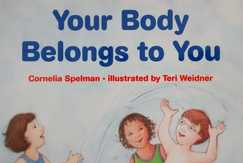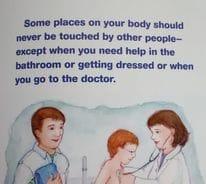
I have been sexually abused by at least three different men in this lifetime. This is unfortunately not unusual. I’ve seen statistics that suggest one in four women have been sexually abused, but I suspect the number is closer to one in two. Likewise, I’ve seen numbers ranging from one in five to one in eight men have been sexually abused. No matter what the actual statistics are, the number of victims is still way too high.
I was recently speaking with someone who has a very young daughter. He knows of my history of sexual abuse, and so as a concerned parent, he asked me how I thought we could prevent it from happening to our children. After a moment to think about it, my answer was one that I don’t like but which I think is ultimately true: We can’t. Sexual abuse is going to happen. We can do some small things to try to ward it off. We can teach our children not to abuse others in hopes of lessening rates for future generations. But like most traumas and tragedies, even with the best preparation for prevention, it will still happen.
So what can we do try to reduce the number of children who are sexually abused short of locking our children into padded cells? The biggest thing we can do is teach our children that their bodies are their own, and no one should touch their bodies without their consent. Then we need to respect what we teach them. That means ending corporal punishment. That means stopping the horrible social custom of making our children hug and kiss distant relatives and unknown adult friends whom they don’t know or care about. It means letting our children know that they are the ones who are in charge of their bodies and “no” is an appropriate response when someone wants to touch them in a way they don’t feel comfortable with.

So how do we figure out whom we can trust? The biggest way is to learn how to follow your gut feelings. Listen to that voice inside you when it tells you no. That inner voice is something or someone trying to protect you. If you feel unsafe or uncomfortable with a situation, then don’t put your child into it and/or don’t put yourself into it. Furthermore, if your child tells you, “I don’t trust that person,” listen to them. Find out why your child doesn’t feel comfortable. If it’s an instinctive response, respect your child’s intuition. Children are often far more in tune with their intuition than adults because they haven’t learned to ignore it through society’s mandates. Teach your children to respect their gut feelings, too.
Another very important aspect of sexual trauma is that victims are often not believed. If your children ever tell you that someone has touched them inappropriately, believe them. Do not punish them for what has happened to them. They are children, and they did not know what was happening to them. They were unable to give consent. No older child or adult ever should be touching them inappropriately. Instead, once you have listened to their version of events, seek counseling for them and report the event to the proper authorities. Hiding sexual trauma only allows it to continue, and others will likely become victims to the same perpetrators.
One other way to help reduce sexual trauma (which is not a method all will find palpable) is through energetic work on our second chakras. I believe that many of those who are sexually abused as young children have been sexually abused in previous lives. They come into this life with already damaged second chakras, and that weakness energetically attracts those who will abuse them again. Healing any damage to our children’s second chakras and/or strengthening their second chakras will reduce sexual predators’ attraction to them. This work can be done with talented energy workers who have already healed any sexual trauma they might have endured. If they have not healed their own traumas, you don’t want to have them working on you or your children.
Sexual abuse is scary. It scars us deeply, even when it happens at a very young age. The damage it causes can become the roots for physical illness as it did in my case. Thus, it’s very important that sexual abuse of children be taken seriously so that it does not cause a lifetime of damage. Preventative education can help children stop sexual trauma from happening, but if they don’t know that what is happening is wrong, they won’t be able to stop it. Likewise, education can help victims learn to report what happened rather than living with a sense of shame that they caused the abuse to happen to them. While we can’t always prevent sexual abuse from happening, we can support victims appropriately and prevent perpetrators from acting again.
©2017 Elizabeth Galen, Ph.D., Green Heart Guidance, LLC
 RSS Feed
RSS Feed